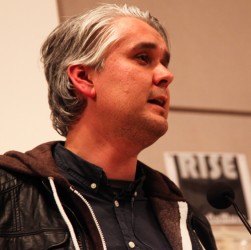Article Origin
Volume
Issue
Year
Interview by David P. Ball for Windspeaker with UBC First Nations Studies professor Glen Coulthard of the Yellowknives Dene First Nation.
Windspeaker: Where do you see the Idle No More movement heading next?
Glen Coulthard: Idle No More, and the tactics it’s involved so far, will have to continue, and not bow to pressure from Canada, but also potentially the more mainstream First Nations leadership and the Assembly of First Nations. If substantive changes aren’t being made to restructure the relationship between First Nations and Canada, [Idle No More] has got to proceed with what it’s done so far; rapidly disseminated actions, like the flashmobs and blockading that have emerged, will have to proceed, if not escalate.
W.: What about Idle No More’s message? Do you think it’s getting heard?
GC: Yes, but in order to not get trapped in the mirage that it’s simply a reaction – without any promises to develop alternatives – we have to start to think about getting that message across.
There’s been a number of proposals, ranging from the recommendations of the Royal Commission on Aboriginal Peoples, which calls for Indigenous peoples to have delegated to them, or devolved, their own authority over their land base …, to talk of Canada living up to its treaty obligations already. And there’s the United Nations Declaration on the Rights of Indigenous Peoples, which Canada is a signatory to; living up to the obligations that are legal norms.
W.: Which of these approaches do you think would be most effective?
GC: Personally, I think a lot of the questions revolve around land and authority over it, to break the back of colonial dependency among Indigenous people. There are a lot of proposals... which need to be examined in detail. One is the revitalization of Indigenous economies, land-based economies. Usually this gets characterized as just a “back to the land” fantasy, but a lot of research historically has looked at the sustainability of mixed economies, subsidized by contemporary economic ventures, and with the diversion of funds from mainstream economies to revitalizing traditional practices on the land.
W.: Could you talk about some of those values that should inform an Indigenous economy?
GC: We have to think about more ways of relating economically to our homelands, in ways that are sustainable. To do that, we have to start thinking about alternative modes of production. Capitalism is based by definition on modes that are not sustainable.
We as Indigenous people can draw insights from land-based practices, and apply them to contemporary institutional settings. This is really interesting about the proposals before, [which] were attempting to apply our values as Indigenous peoples to how we go about producing and relating to the land, to sustain an independent existence.
W.: If we could talk about Idle No More a bit, what do you make of some of the tensions that have arisen over what tactics the movement should use to achieve its goals?
GC: Often, the tensions are between the grassroots and leaders attempting to enter into some sort of negotiations with the federal government. But they have to toe a line around assertive direct actions in order to make headway. These are products of the Indian Act and the acts that preceded it over a century.
National and cultural differences amongst First Nations are absolutely essential. The fact that these conversations are happening should be seen as a good thing, not a bad thing. We should embrace those differences and conversations that come out of them. They give us perspectives on what we should do. They give us different points of view from different traditions. That conversation gives us a host of alternatives and ways of thinking about how to proceed. Difference should be embraced.
We have seen the demands emanating from the grassroots sharpening and becoming even more precise. Before, it used to be housing conditions, the material conditions on reserves, and the attack on some of the environmental and land concerns with one omnibus Bill C-45. Those were symptomatic of the colonial relationship. Now we’re focusing on the core issue: setting right the relationship between Indigenous and non-Indigenous peoples in Canada. That requires two fundamental changes – changes to Indigenous peoples’ land bases, and authority over their communities and lands. We’re seeing this very precision emerging in the Idle No More movement, which was previously just dealing with symptoms.
W.: A lot of the criticisms have been around the use of blockades as a tool for change. What are your thoughts on that?
GC: The blockading tactic has been one of the more effective tools in First Nations and Indigenous peoples’ arsenals for decades now. It’s proven itself in that way. It’s not aggressive; it’s been peaceful, and for the most part, historically, it has remained so.
There is a lingering assumption – or demand, actually – from both some Indigenous people and Canadians, with respect to this movement “shooting itself in the foot” if it begins to upset people. There’s a demand on Indigenous activisms that they not be too disruptive, because it will upset Canadians. This will damage the cause; I think that placing that demand on Indigenous peoples poses the most damage to the cause.
W.: What sort of damage?
GC: The transformative changes required in order to fix this relationship–where Indigenous people can live cultured, healthy lives in relationship to their communities and territories–requires the dismantling of a good solid two centuries of privilege and power amassed by the dominant society, in particular, its political and economic interests. That is going to upset people, particularly those interests, when it’s corrected! The idea that we can proceed without being disruptive or upsetting the powers that be seems an unreasonable demand, which will result in the solidification of the status quo.
W.: What about the worries among some in Idle No More that this support might be alienated by more disruptive tactics?
GC: I think there’s an element of truth – yeah, it’s disruptive. Of course it’s going to be! We’re challenging illegitimate power and privilege amassed over at least two centuries, if not longer here in Canada. That’s not to dive into questions of strategy or tactics uncritically. These conversations are happening all the time, everywhere, over what is to be done to pursue our justice struggles in the most effective way. What we’re seeing here is a good thing.
W.: What inspires you about the Idle No More movement, overall?
GC: What is inspiring, to me, is how broad-based it’s becoming. There was a lot of focus on youth before, which had to do with its dissemination on social media, which was really important in getting people mobilized, and of creating this really large conversation and discussion on our rights and what to do next. But to leave it at that is a misnomer–it’s being influenced by the values of elders, the knowledge bases of our ancestors, and of course women have been central in all this as well.
This is really a grassroots, broad-based movement which is utilizing all sectors of Indigenous society, and informing what we ought to do next to build alternatives to the colonial relationship that exists now.
- 5403 views


